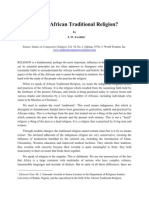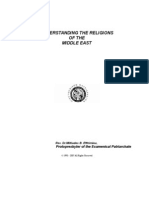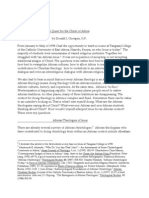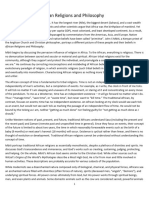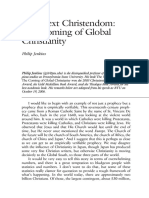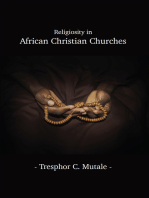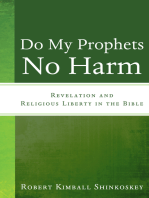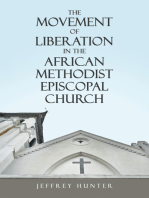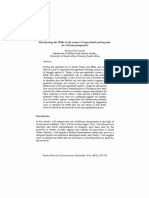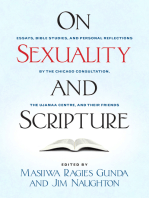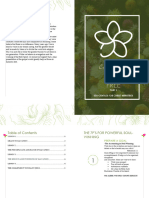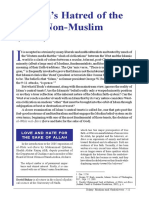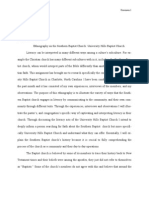0 ratings0% found this document useful (0 votes)
150 viewsGroup 2 - Chapter 3
Group 2 - Chapter 3
Uploaded by
api-209396844Copyright:
© All Rights Reserved
Available Formats
Download as PPTX, PDF, TXT or read online from Scribd
Group 2 - Chapter 3
Group 2 - Chapter 3
Uploaded by
api-2093968440 ratings0% found this document useful (0 votes)
150 views34 pagesOriginal Title
group 2 - chapter 3
Copyright
© © All Rights Reserved
Available Formats
PPTX, PDF, TXT or read online from Scribd
Share this document
Did you find this document useful?
Is this content inappropriate?
Copyright:
© All Rights Reserved
Available Formats
Download as PPTX, PDF, TXT or read online from Scribd
Download as pptx, pdf, or txt
0 ratings0% found this document useful (0 votes)
150 views34 pagesGroup 2 - Chapter 3
Group 2 - Chapter 3
Uploaded by
api-209396844Copyright:
© All Rights Reserved
Available Formats
Download as PPTX, PDF, TXT or read online from Scribd
Download as pptx, pdf, or txt
You are on page 1of 34
Old and New
Chapter 3 - Africa and the Old Testament
Summary of Chapter 3
If present day Africans still find it difficult
to be at home with the Old Testament, they
might need to watch out to see if they have
not lost their Africanness in one way or the
other
- Madiponane Masenya
The Hebrew and the Christian Bible
The Gray Contrast between the
New and Old
o Wood reference to the
cross
o Mary and the burning bush
o Water Blood
o Abraham and Isaac = God
and Jesus
Old Testament labeled as the bad
Testament
o The fight between Christians
(New Testament) and Judaism
(Old Testament)
o Christianity superseded Judaism
or Christianity completes Judaism
The battle has overshadowed the
many holocausts that has happened
outside Europe
Our Testament
Parallels between African culture and the Old
Testament
o Nomadism
o Polygamy
o Ritual sacrifice/ libation
o Authority through genealogy
o A tribes claim to land
o They live the old Testament, no interpretation
needed
Our Story
Popular African belief is that their people directly stem from the
history of the Hebrews as descendants of the lost tribes
African Christians find many similarities between Old Testament
stories and their present social and political reality
Some Africans question that the people who wrote and re-wrote
the Bible removed Jesus stay in East Africa
Africas Old Testament
Africans perceive themselves as a continuation of Judaism or as the new
Jews
When disputes arise about the differences between the Old and New
Testament, African Christians accept the Old Testament theology as superior
Old Testament traditions are continued to be practiced by modern African
Christians
o Dietary Law
o Saturdays as the Sabbath
o Temple and Priests
o Polygame and circumcision
No Other Gods
For African and Asian countries the presence of pagan gods is very alive and real in the
cultures
Idolatry and pagan rituals are commonly practiced traditions and therefore it acts as a
temptation for the Christians to also engage (like the golden calf and the Israelites)
Eg: Animal blood sacrifices are used as a means to commune with ancestors at
important occasions:
o Marriage & funerals
o Illness & unemployment
o Birth of a child
African Christians are warned not to participate in rituals not aligned in the bible
Reading from the Old
Global South Christians were attracted to the Old Testament
o living source of authority
o moral laws of Old Testament covenant
o Genesis, Exodus, Isaiah, Ecclesiastes and Proverbs
New Testament
o Matthew Most Jewish
o Acts parallels between New and Old Testament
o Mainly Pauls work
Old customs, the old laws, contained a foundation on which the new
religion was built
Blood of the Lamb
African culture understands sacrifice within the Old
and New Testament
The Epistle to the Hebrews is OUR Epistle
o deep tradition of sacrifice, priestly mediation,
and ancestral function
The Book of Revelation clearly speaks to Africans
Special relationship between sacrifice, priesthood and
the Levites
See themselves as old testament prophecy
Ways to Live - Proverbs
Wisdom Literature- Book that
offer practical means for living
o highly recognizable in
African and Asian Cultures
by time of Christianity
The Elder Say
o Proverbs are treated as
collective wisdom of the
ancestors
Theres no contradiction
between biblical wisdom and
African wisdom since both are
based on human experience and
inspired by God himself -Anne
Nasimiyu- Wasike
Elevated authority of proverbs
does not entail slavish literalism
Wisdom Literature: The Epistle of James
One of the most commonly cited
works in sermons in the AICs
o Reasons for appeal:
Spiritual healing
Persecution and
resistance
Activism and social
justice
Interfaith relations
St. Jamess Epistle is really an
epistle of straw compared to
[St. Pauls letters], for it lacks
this evangelical character.
Martin Luther
Practical lessons on living day-
to-day in an alternative society
away from the cultural
mainstream
The Rule of God
In Asia and Africa there is a large importance placed on national and
community righteousness. They used the bible to find examples of God
rewarding or punishing nations based on the actions of the people. Non-
Christian worship and biblically immoral acts are cited as the cause of
things like poverty, sickness or natural disasters
If my people, which are called by my name, shall humble themselves,
and pray, and seek my face, and turn from their wicked ways; then will
hear from heaven, and will forgive their sin, and will heal their land.
(2 Chronicles 7:14)
Old and New Jews
In many southern church tradition Christ is viewed as being a huge
diversion to the temple Judaism of the Old Testament. Because there are
often not Jewish communities in these area, this idea isnt checked by an
interaction with a modern Jewish Community
This lack of interaction leads to a mind set that, while not necessarily
anti-Semitic, could often be viewed as anti-Jewish. The Jewish people of
the bible are seen as Jesus oppressors, which is translated onto
oppression the modern Christian readers experiences.
The Research
Continues...
Interpreting the Old Testament in Africa
Some contemporary African interpreters of the OT argue that the ancient
Jewish society was influenced by ancient African cultures
Generally if we examine the Bible, we find many references to
Ethiopia.. Among these, some of them are definitely about Ethiopia as its
boundaries are today. (Mikre-Selassie 1972: 193)
To support this claim evidence is pulled from the OT which references
the Kingdom of Cush (an African State) 56 times
Kingdom of Cush/Kush
Known to be an ancient African state (south of Egypt) (west of the Nile)
Described as a wealthy, strong, powerful and exotic empire
Cushites (From Ancient Kingdom of Cush
The Etymology and Hebrew
meaning of the word Cush is
uncertain but from Biblical text
it often refers to Cushites as
having a black countenance
(Jeremiah 13:23) Can the
Cushite change his skin?
This verse associates Cushites
with having a dark/black skin
color
Contined
The Cushite woman of Moses
(Numbers 12)
Cushite Servant of Joab (Samuel
18:19-33)
Queen of Sheba and King
Solomon (1 Kings 10:1-10)
Ebed Melec, the Cushite who
rescued the prophet Jeremiah
(Jeremiah 38:7-12)
Ethiopian Eunuch (Acts 8:26-40)
Stresses the important role African
individuals play in the biblical text
From the African perspective these
examples demonstrate that the God
of Israel included the Africans in his
salvation history throughout the
Bible
The continent of Africa has been
rooted in Judaism and Christianity
and are not merely recent additions
from the West.
Interpreting the Old Testament in Africa II
The Old Testament gives a positive portrayal of African
nations and African individuals that are highly
respected by Israelites
The Africans were important in the formation of the
Jewish culture in areas of economy, politics and
religion
people tend to read text from a lens that is influenced
by their own cultural bias
Nazaretha Church - South Africa
iBandla lamaNazaretha
Isaiah Shembe (1867-1935)
1906: Becomes a member of the
African Baptist Church
Jehova spoke to Shembe when
he was struck during a
thunderstorm
o 1911 - Founding of the church
o 1913 - Nhalangakazi (Holy
Mountain or Sinai
o 1914 - EKuphaKameni
Restoration of the Zulu Nation
o Anglo Zulu Wars of 1879
o Zulu Rebellion of 1906
Prophet like status: Mediator
between God and his people
Use of Hebrew Bible: The Sabbath
There is no forgiveness to him who breaks the observance of the Sabbath day. All other sins may
be forgiven but he who breaks the Sabbath day will never be forgiven (Numbers 15:32-33;
Leviticus 19:30). - Isaiah Shembe
Fear you Jehovah and listen most obediently to this word that says, Observe the Sabbath and
keep it holy. You must not do work on the Sabbath. He who works on the Sabbath shames it, let
him die even the death. Fear you death and observe the Laws of Jehovah (Exodus 31:14-16).
- Isaiah Shembe
Observe the Sabbath, because it is holy to you. Anyone who desecrates it is to be put to death;
those who do any work on that day must be cut off from their people. For six days work is to be
done, but the seventh day is a day of Sabbath rest, holy to the LORD. Whoever does any work on
the Sabbath day is to be put to death. The Israelites are to observe the Sabbath, celebrating it for
the generations to come as a lasting covenant. (Ex. 31:14-16, NRSV)
Sacrifice
Through sacrifice, humans seek to encounter the
divine, project themselves into the invisible world,
penetrate into the divine presence and commune with
the deity. (Hebrews: Sacrifice in an African
Perspective 535)
Ultimately sacrifice is a human activity. Its primary
beneficiaries are the humans who offer them, not God
or the deities to whom the offerings are made.(H:SAP
536)
Sacrifice - Continued
Sacrifice is culturally relevant to Africans. Priestly sacrifice has its roots
in ancient Africa and Sacrificial practices from the heart of African
Traditional Religions.(H:SAP 535)
What humans do is to seek to become pure, and free of sin through ritual
purity, and after that commune with God through sacrifice. Sin is the
block between man and God.
In Hebrews, Paul establishes that Jesus is the final sacrifice needed.
Okures analysis is that this is the opposite of normal sacrifice. Rather
than man reaching out to God it is God providing a perfect sinless
gateway for humans.
Sacrifice - Continued
According to Jenkins the relation here is that African culture is more
closely and recently tied to a tradition of sacrifice. As such they relate
more closely to Hebrews than Northern and Western Christians do. In it
Paul makes clear that Jesus is the ultimate sacrifice. Jenkins quotes
Kwame Bediako as saying, ...the traditional perfunctory rituals of
Odiwara, repeated year after year, have in fact been been fufilled and
transcended by the one, perfect Odiwara that Jesus Christ has
performed once for allThe Odiwara to end all Odiwars has taken place
through the death of Jesus Christ.(55)
Art, Music and Popular Culture
Freedom For Slaves
Improved literacy for Slaves (David Walker 1829)
Parallels drawn between African and Egyptians
Argues that Africans are great contributors of
arts and science, not the dark stained seed of
Cain
Leads way to many Hebrew Bible interpretations
Art, Music and Popular Culture
Books directed to demographic
o Be Restored! Gods Power
for African American
Women
o From one Brother to
Another: Voices of African
American Men
Signal Songs
Art, Music and Popular Culture
Moses becomes an Icon
Comic books created
o Genesis 5
Biblical references found in music
o Bone Thugs-n-Harmony
Esther
The Context
o Writings in the Hebrew
Bible
o Conflict within the Diaspora
in Persia
Esther as depicting times of
peaceful coexistence and tensions,
which often mark tribal/ regional
conflicts between the powerless
minority and the powerful majority
African people
Brief Summary
o Esther, a Jewish
woman, Marries a
king (Ahasuerus)
o Haman and Mordecai
conflict
o Esther saves her
people
o festival of Purim
Esthers Importance
Why did the Africana people relate so well to the Book of Esther?
mirrors the causes and effects of extreme tension between different
genders, classes and ethnic groups in the contexts of Africans and Jews
Esther raises important issues of the impact of colonialism on African
cultures
o Anger, bitter, local tensions, ethnic, regional, tribal and communal
problems
o making Jews in the Diaspora and African cultures relatable
Strong females within the court systems, used as ears and foil plots
through wisdom
Leads to their own festivals much like that of Jews with Purium
Esther
Glidzi and Hogbetsotso festivals in
Southeastern Ghana, West Africa
Discussion Questions
Jenkins opens chapter 3 with a quote from Madipoane Masenya, If
present day Africans still find it difficult to be at home with the
Old Testament, they might need to watch out to see if they have
not lost their Africanness in one way or the other. This sort of
living relationship with the Old Testament is one that is not
experienced so strongly in places like Europe or the United States.
What factors have lead to this seeming divergence (give examples
from the chapter)? How does the Southern culture interact with
Christianity and vice versa? How does this interpretation of
Christianity differ from your own conception or assumptions about
Christianity?
Question 1
Jenkins points to how some Global South Churches still contain
influences of traditional religion. He goes on to suggest that these
traditions serve as Africa's Old Testament. That is to say,
traditional religion is treated in a similar manner compared to how
modern Euro-American Christians read and interpret the Hebrew
Bible. In what ways does he propose that traditional religion
functions as an Old Testament for the AICs? Do you agree with
this analogy? If traditional religion does in fact serve as Africas Old
Testament, what implications are there about its relevance for
modern practice? Furthermore, in what ways might this threaten or
disrupt the Global North perception of Christianity?
Question 2
You might also like
- Alice A Bailey 24 Books & CompilationsDocument46 pagesAlice A Bailey 24 Books & Compilationssssskkkkllll94% (31)
- African American Christian Worship: 2nd EditionFrom EverandAfrican American Christian Worship: 2nd EditionRating: 3 out of 5 stars3/5 (2)
- Indian Christian Theology PDFDocument217 pagesIndian Christian Theology PDFeslish bhuyan94% (17)
- J.O. Awolalu - What Is African Traditional ReligionDocument10 pagesJ.O. Awolalu - What Is African Traditional Religionwandersonn100% (1)
- Inside the Whirlwind: The Book of Job through African EyesFrom EverandInside the Whirlwind: The Book of Job through African EyesNo ratings yet
- The Wayfarer: Perspectives on Forced Migration and Transformational Community DevelopmentFrom EverandThe Wayfarer: Perspectives on Forced Migration and Transformational Community DevelopmentNo ratings yet
- Understanding The Religions of The Middle EastDocument24 pagesUnderstanding The Religions of The Middle EastmiltiadesII100% (3)
- Africans and Africa in the Bible: An Ethnic and Geographic ApproachFrom EverandAfricans and Africa in the Bible: An Ethnic and Geographic ApproachNo ratings yet
- Vusamazulu Credo Mutwa Sangoma African S PDFDocument23 pagesVusamazulu Credo Mutwa Sangoma African S PDFGerrit06No ratings yet
- FreeMasonry, Shriners, Eastern Star, Illuminati, Bilderbergers and OthersDocument25 pagesFreeMasonry, Shriners, Eastern Star, Illuminati, Bilderbergers and OthersXR500Final100% (9)
- African ChristologiesDocument32 pagesAfrican Christologiesestifanostz100% (3)
- book-summary-african-religions-and-philosophyDocument3 pagesbook-summary-african-religions-and-philosophytheophilusmkpuechineNo ratings yet
- Vision in Progress: Framing the Portrait of Indian Baptists in South AfricaFrom EverandVision in Progress: Framing the Portrait of Indian Baptists in South AfricaNo ratings yet
- Becoming Like Creoles: Living and Leading at the Intersections of Injustice, Culture, and ReligionFrom EverandBecoming Like Creoles: Living and Leading at the Intersections of Injustice, Culture, and ReligionRating: 5 out of 5 stars5/5 (1)
- African Traditional ReligionDocument6 pagesAfrican Traditional Religionokoegualeisidore31No ratings yet
- The Land of The Heart of LivingstoneDocument211 pagesThe Land of The Heart of Livingstonericksonyonah24No ratings yet
- Christian identity and justice in a globalized world from a Southern African perspectiveFrom EverandChristian identity and justice in a globalized world from a Southern African perspectiveNo ratings yet
- The Bible, the Bullet, and the Ballot: Zimbabwe: The Impact of Christian Protest in Sociopolitical Transformation, ca. 1900–ca. 2000From EverandThe Bible, the Bullet, and the Ballot: Zimbabwe: The Impact of Christian Protest in Sociopolitical Transformation, ca. 1900–ca. 2000No ratings yet
- God-Concept: Supreme Being in African Tribal Religions: Dharmaram JournalsDocument20 pagesGod-Concept: Supreme Being in African Tribal Religions: Dharmaram JournalsPromise ChikumbaNo ratings yet
- Cross-Cultural Stumbling Blocks On The Mission Field PDFDocument17 pagesCross-Cultural Stumbling Blocks On The Mission Field PDFChris VillasisNo ratings yet
- Stewards of Grace: A Reflective, Mission Biography of Eugene and Phyllis Grams in South Africa, 1951–1962From EverandStewards of Grace: A Reflective, Mission Biography of Eugene and Phyllis Grams in South Africa, 1951–1962No ratings yet
- Christianity in Early Africa: Ancient Traditions, Profound ImpactDocument0 pagesChristianity in Early Africa: Ancient Traditions, Profound ImpactAngela BuzeaNo ratings yet
- The Next Christendom: The Coming of Global Christianity: Philip JenkinsDocument13 pagesThe Next Christendom: The Coming of Global Christianity: Philip JenkinsIvan SenaNo ratings yet
- African Theology: The Case For MwariDocument5 pagesAfrican Theology: The Case For MwariTalking WisdomNo ratings yet
- Africans in Diaspora and Diasporas in AfricaFrom EverandAfricans in Diaspora and Diasporas in AfricaBulus GaladimaNo ratings yet
- 3rd Sunday After Pentecost C 2016Document4 pages3rd Sunday After Pentecost C 2016api-244237906No ratings yet
- Do My Prophets No Harm: Revelation and Religious Liberty in the BibleFrom EverandDo My Prophets No Harm: Revelation and Religious Liberty in the BibleNo ratings yet
- Prophetism and Evangelism in AfricaDocument14 pagesProphetism and Evangelism in AfricaChristian Tsekpoe100% (1)
- Christianity As A Double-Edged Sword in Colonial AfricaDocument12 pagesChristianity As A Double-Edged Sword in Colonial AfricaEricka W.No ratings yet
- Samuel Arhin Writing Sample For ApplDocument5 pagesSamuel Arhin Writing Sample For ApplPamela OdwiraNo ratings yet
- The Movement of Liberation in the African Methodist Episcopal ChurchFrom EverandThe Movement of Liberation in the African Methodist Episcopal ChurchRating: 5 out of 5 stars5/5 (1)
- African-American Religion: A Confluent of African Traditional Religion and ChristianityFrom EverandAfrican-American Religion: A Confluent of African Traditional Religion and ChristianityNo ratings yet
- Journal of African Instituted Church Theology: Volume II, Number 1, September 2006Document16 pagesJournal of African Instituted Church Theology: Volume II, Number 1, September 2006michael olajide100% (1)
- Righteous Gentiles in the Hebrew Bible: Ancient Role Models for Sacred RelationshipsFrom EverandRighteous Gentiles in the Hebrew Bible: Ancient Role Models for Sacred RelationshipsRating: 3 out of 5 stars3/5 (2)
- Women: Called by God, Appointed by God, and Approved by PaulFrom EverandWomen: Called by God, Appointed by God, and Approved by PaulNo ratings yet
- Farisani. "Interpreting The Bible in The Context of Apartheid and BeyondDocument19 pagesFarisani. "Interpreting The Bible in The Context of Apartheid and BeyondNdikho Mtshiselwa, PhDNo ratings yet
- African Biblical Interpretations After ColonialismDocument42 pagesAfrican Biblical Interpretations After ColonialismOrockjoNo ratings yet
- WR JudaismDocument54 pagesWR JudaismAshley Monique PalisaNo ratings yet
- On Sexuality and Scripture: Essays, Bible Studies, and Personal Reflections by the Chicago Consultation, the Ujamaa Centre, and Their FriendsFrom EverandOn Sexuality and Scripture: Essays, Bible Studies, and Personal Reflections by the Chicago Consultation, the Ujamaa Centre, and Their FriendsMasiiwa Ragies GundaNo ratings yet
- Fiqhalzakah Vol1Document270 pagesFiqhalzakah Vol1Daouda ZORENo ratings yet
- Acts: Courageous Witness in a Hostile World: A Guide for Gospel Foot SoldiersFrom EverandActs: Courageous Witness in a Hostile World: A Guide for Gospel Foot SoldiersNo ratings yet
- Learning from the Least: Reflections on a Journey in Mission with Palestinian ChristiansFrom EverandLearning from the Least: Reflections on a Journey in Mission with Palestinian ChristiansNo ratings yet
- The Identity Theft: The Return of the 1st Century MessiahFrom EverandThe Identity Theft: The Return of the 1st Century MessiahNo ratings yet
- The World of Jesus: Making Sense of the People and Places of Jesus' DayFrom EverandThe World of Jesus: Making Sense of the People and Places of Jesus' DayRating: 4 out of 5 stars4/5 (1)
- Features of African CosmosDocument9 pagesFeatures of African CosmosCheryl PidonoNo ratings yet
- Theologizing in Black: On Africana Theological Ethics and AnthropologyFrom EverandTheologizing in Black: On Africana Theological Ethics and AnthropologyNo ratings yet
- Articleon Christianityin AfricaDocument11 pagesArticleon Christianityin AfricaKingdom MindsetNo ratings yet
- The Fair Dinkum Jew: The Survival of Israel and the Abrahamic CovenantFrom EverandThe Fair Dinkum Jew: The Survival of Israel and the Abrahamic CovenantNo ratings yet
- Exploring Our Hebraic Heritage: A Christian Theology of Roots and RenewalFrom EverandExploring Our Hebraic Heritage: A Christian Theology of Roots and RenewalRating: 5 out of 5 stars5/5 (2)
- Abraham Our Father: Paul and the Ancestors in Postcolonial AfricaFrom EverandAbraham Our Father: Paul and the Ancestors in Postcolonial AfricaNo ratings yet
- Religious IntoleranceDocument20 pagesReligious IntoleranceTofaNo ratings yet
- Shi/'i in BibleDocument192 pagesShi/'i in BibleMohammad N.H. Gilani100% (7)
- Unmistakably Christian Tom Shepherd Ch1 9780816367993Document11 pagesUnmistakably Christian Tom Shepherd Ch1 9780816367993Kendrick GlasgowNo ratings yet
- Abandonment of Church by Youth-Believers in The......Document97 pagesAbandonment of Church by Youth-Believers in The......martin pulpitNo ratings yet
- Al-Baqillani - The Maliki Faqih, Ash'arite Mutakallim, and Qur'anic CommentatorDocument1 pageAl-Baqillani - The Maliki Faqih, Ash'arite Mutakallim, and Qur'anic Commentatorlmdwdwdqk0% (1)
- Called To Be Free: Sea Gentiles For Christ MinistriesDocument21 pagesCalled To Be Free: Sea Gentiles For Christ Ministrieschill chillNo ratings yet
- St. Mary's Catholic ChurchDocument8 pagesSt. Mary's Catholic ChurchSaintMarysMaltaNo ratings yet
- Who Is The Filipino ChristianDocument2 pagesWho Is The Filipino ChristianmasorNo ratings yet
- birthday-prayer-serviceDocument4 pagesbirthday-prayer-servicemarkchristian.almazanNo ratings yet
- Armitage - Certain Rectitude of Order - Jesus & Justification According To Aquinas (2008) PDFDocument18 pagesArmitage - Certain Rectitude of Order - Jesus & Justification According To Aquinas (2008) PDFP. José María Antón, L.C.No ratings yet
- Empowering YouthDocument43 pagesEmpowering Youthboetabrad100% (1)
- Oprah Winfrey, Joel Osteen and Billy GrahamDocument8 pagesOprah Winfrey, Joel Osteen and Billy Grahamacts2and38100% (2)
- 2timoth2,8 13Document4 pages2timoth2,8 13Soneat PenNo ratings yet
- A Response To Dr. Ernest Martin - by - Leen RitmeyerDocument1 pageA Response To Dr. Ernest Martin - by - Leen RitmeyeritickNo ratings yet
- Phillips Woodrow Marjorie 1971 San Jose BCDocument4 pagesPhillips Woodrow Marjorie 1971 San Jose BCthe missions networkNo ratings yet
- 7 Signs YouDocument7 pages7 Signs YouTherese MaeNo ratings yet
- TheGospelProjectAdults PreviewGuideDocument40 pagesTheGospelProjectAdults PreviewGuideLeandroRocha100% (1)
- Got QuestionsDocument2 pagesGot QuestionsRoma Blanz De AlaNo ratings yet
- The Epistle of Colossians 2024 EditionDocument253 pagesThe Epistle of Colossians 2024 Editionfolokowatson23No ratings yet
- Dispensation A Theology HeidemanDocument11 pagesDispensation A Theology Heidemanreybeez100% (1)
- Marriage As A Path To Holiness: - David and Mary FordDocument16 pagesMarriage As A Path To Holiness: - David and Mary FordMariel MartinezNo ratings yet
- Islam's Hatred of The Non-MuslimsDocument10 pagesIslam's Hatred of The Non-MuslimswholesoulazNo ratings yet
- 12 Articles of FaithDocument15 pages12 Articles of FaithouanorjayNo ratings yet
- Musical Night ScriptDocument3 pagesMusical Night ScriptEmily BondadNo ratings yet
- Global Harvest, Volume 6Document84 pagesGlobal Harvest, Volume 6World EvangelismNo ratings yet
- Ethnography Paper 11-24-12Document10 pagesEthnography Paper 11-24-12csorens3No ratings yet
- Go Grow GlowDocument115 pagesGo Grow GlowLudovico MasmelaNo ratings yet



